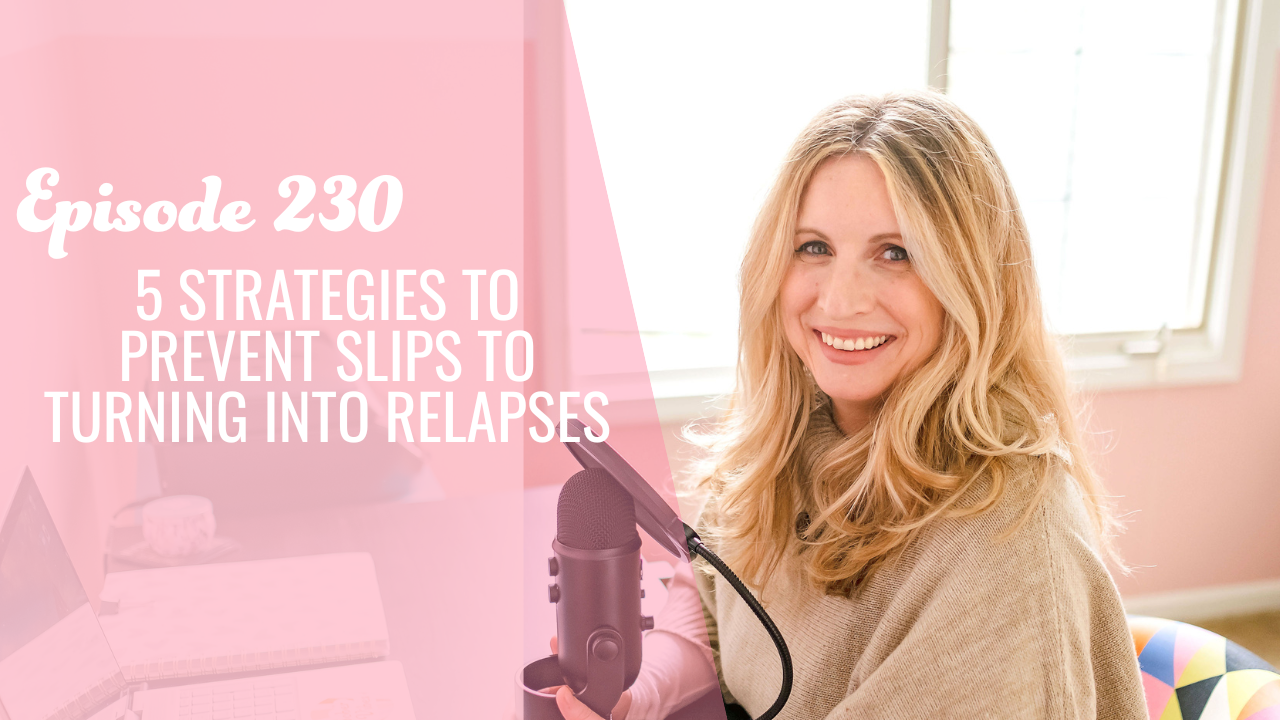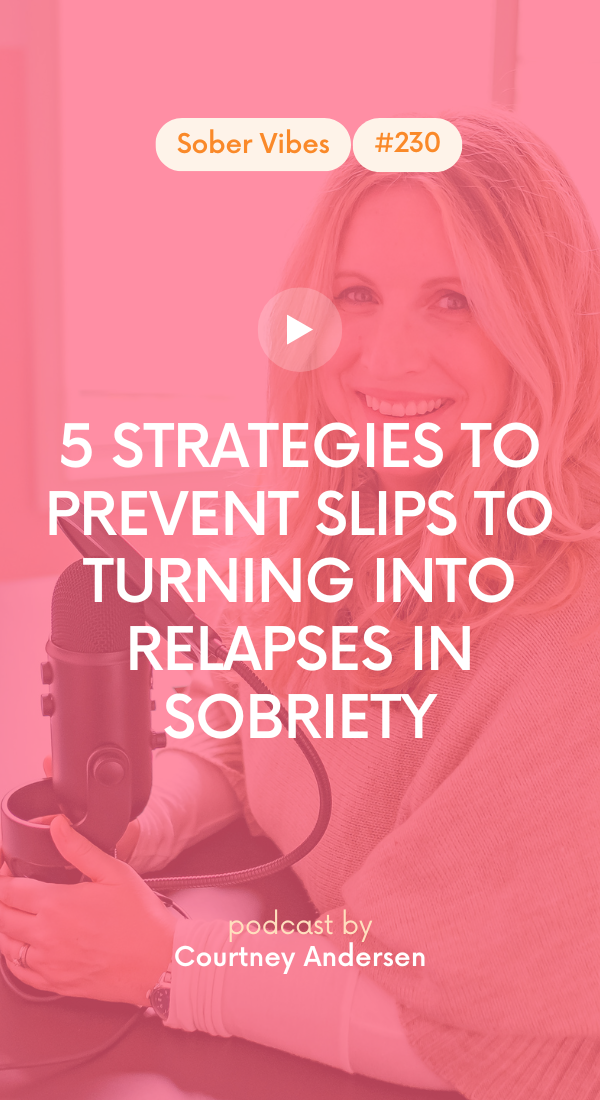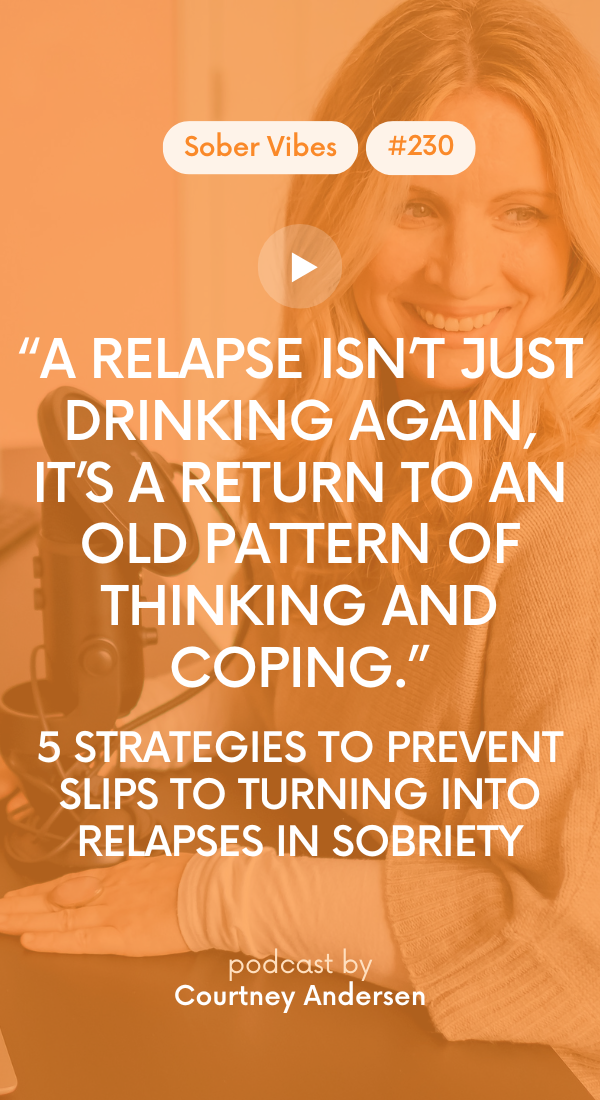5 Strategies to Prevent Slips to turning into Relapses
Aug 26, 2025
Episode 230: 5 Strategies to Prevent Slips to turning into Relapses
Spotify | Apple Podcast | Website
"You cannot keep going at the pace you were going in your drinking days and expect to stay sober.”

Here’s a glance at this episode...
If you’ve ever found yourself saying “well, I wasn’t physically dependent on alcohol” as a way to downplay your drinking, you’re not alone. It’s a phrase that comes up often, and while it might sound reassuring at first, it can actually cloud the reality of your relationship with alcohol.
Not being physically dependent doesn’t automatically mean your drinking is harmless. Alcohol can impact your life, health, and emotional well-being in ways that don’t show up as physical withdrawal symptoms. In this post, we’re going to explore what that distinction really means, why it matters, and how you can start viewing your drinking habits through a more honest and empowering lens.
What you will learn in this episode:
- Redefining relapse as more than “picking up a drink”
- Why shame and ego make relapse harder, not easier
- Five common relapse triggers to watch for
- Practical prevention strategies
- The importance of revisiting and redefining your “why” as sobriety evolves
Redefining Relapse
Most people think relapse means one thing: picking up a drink. But that’s only part of it. A relapse actually starts way earlier. It’s a return to old patterns of thinking and coping. It’s when you slip back into isolation, avoidance, perfectionism, people-pleasing, or numbing behaviors that look suspiciously like your drinking days.
And sometimes, there’s a lapse before a relapse. Maybe you slip once, but you catch yourself and recommit quickly. That doesn’t mean you failed. It means something needs attention and a plan. When you start looking at relapse this way, it takes away some of the all-or-nothing panic.
So if you’ve slipped, please hear me: you are not a failure. You’re human. And you’re still moving forward.
Section 2: Why Shame Has No Place Here
Let’s be real: the shame spiral around relapse is tired. It’s outdated. We are in 2025, and shame is lame. It cannot be the choice anymore.
Here’s what happens when shame takes over: you convince yourself you’ve ruined everything. You beat yourself up. And what do you do when you feel like crap? You drink more. Shame fuels the cycle.
Instead, I want you to start practicing radical honesty without judgment. Sobriety is a lifelong, evolving process. Even 12 years in, I check myself constantly. Ego is sneaky. Ego whispers, “I got this, I don’t need to work on it anymore.” That’s usually when the slip happens.
The truth is, nobody ever gets to 100% certainty. Sobriety is daily choices, consistent tools, and continuous growth. So drop the shame, check the ego, and keep doing the work.
Section 3: The 5 Most Common Triggers
From coaching and my own experience, here are the five biggest triggers that can sneak up on you:
- Emotional overwhelm — anger, grief, anxiety, shame. If you don’t know how to process these emotions, numbing starts to look tempting.
- Isolation — pulling back from your people, your routines, your support systems. Silence and solitude can quickly turn dangerous if you’re using them to avoid.
- Romanticizing drinking — that little voice that says “just one glass” is not sexy. Remember the next day: shame spirals, headaches, dry heaving, snapping at your kids or partner. That’s the reality.
- Burnout and perfectionism — doing too much, overcommitting, people-pleasing. You cannot keep the same pace you had in your drinking days and expect to stay sober.
- Losing touch with your why — your reasons for sobriety will shift over time. If you don’t revisit and redefine them, you risk convincing yourself drinking is an option again.
Section 4: Strategies for Relapse Prevention
The good news is that relapse prevention isn’t about willpower, it’s about systems. Here are tools that work:
- Build a support system. Write down three to five people you can text, call, or message when you’re struggling. They don’t even need to know you’re sober yet. Sometimes just asking someone else how they’re doing gets you out of your head.
- Create grounding rituals. Drinking was a ritual, so you need to replace it with new ones. Journaling, walking, breathwork, prayer, meditation. My therapy walk with a weighted vest is non-negotiable — it keeps me grounded and regulated.
- Practice exit strategies. I’m bringing back the 60-minute rule: give yourself permission to leave an event after an hour. Trust your inner compass. Staying too long often leads to sabotage.
- Know your red flags. Doom scrolling, skipping meals, ignoring texts, isolating — those are all signs it’s time to check in with yourself. Be radically honest about where you’re heading.
- Stock a craving toolbox. Keep a fridge full of fun drinks, calming oils, a favorite mantra, or podcasts that pull you back into alignment. Cravings pass. The more you accept them as part of the process, the less power they hold.
Section 5: If You Slip, Here’s What to Do
If you drink again, it does not erase all of your progress. It does not mean you’re back at day one. Here’s what I want you to do instead:
Ask yourself: What was I really needing in that moment? Were you lonely? Burnt out? Angry? Unseen? That’s where the work is.
Ask: What can I learn here? Maybe you need new support, a different therapist, or to finally be honest with the one you have. Maybe you’ve been stagnant and need to re-engage with your tools.
And above all, recommit to your why. That why will evolve. In my early days it was about my family. Later, it became about loving myself, and then about being present for my son. Your why will shift too — let it.
Remember: you’re not starting over, you’re moving forward.
Section 6: Affirmations and Journal Work
I’ll leave you with two practices to keep close:
Journal Prompt: What are the earliest signs I notice when I’m slipping out of alignment with my sobriety? How can I respond sooner?
Affirmation: I protect my peace with powerful choices. I am allowed to create space for healing again and again.
And if that feels cheesy, spin it in your own way. Say “I am that bitch” if that lands better. I don’t care what it is, as long as it empowers you to stand strong in your sobriety.
Conclusion
Relapse prevention is not about perfection. It’s not about shame or fear. It’s about preparation, awareness, and having the right tools ready when life gets messy.
Your journey will always evolve. You’ll redefine your why, shift your habits, and keep learning along the way. That’s how it’s supposed to be.
So wherever you are — day 8, day 80, year 9, or year 13 — know that you are not alone, you are not failing, and you are absolutely capable of living a life without alcohol that feels damn good.
As always… keep on trucking and stay safe out there.

Thank you for listening!
If this episode has helped you, please consider rating and reviewing the podcast. (Five Stars is awesome!)
This helps me continue to make episodes for you.
★★★★★
Please Rate, Review and Subscribe to the Sober Vibes Podcast.
Mentioned in This Episode:
I want you to feel sober NOT boring!
Kickstart your sobriety with my free 2-day video workshop series to master your sober mindset and have FUN in your sobriety journey!








